- Home
- Michael Gruber
The Return: A Novel Page 2
The Return: A Novel Read online
Page 2
He got a black forty-gallon trash bag from the kitchen and opened the top drawer. Out went the impedimenta of former labors, plus the financial stuff, old tax returns, business letters from before email arrived—rustling and thumping into the bag. The bottom drawer held more-personal papers. Here was an old-fashioned red cardboard file marked RICHARD on the index tab in his mother’s parochial school cursive.
He flipped it open. It contained his birth and baptismal certificates, report cards, school awards, a collection of handmade Mother’s Day and birthday cards of increasing competence, right up through his elementary school years, until he had money enough to buy from Hallmark. Then there were the letters he’d sent from his time in the military, scrawled in ballpoint on cheap PX stationery, several smeared with the red soil of Vietnam. He recalled the ones she’d sent him in return, one every few days: quotidian cheerfulness, a recounting of prayers she’d sent up from St. Jerome’s for his safety, and, unconventionally, a series of commentaries about the Catholic antiwar movement, of which Katherine Devlin Marder had been an ornament. He didn’t know where those letters were and felt a pang of regret.
A thin file was marked DAD in Marder’s own neat capitals. This contained a sheaf of papers from Augie Marder’s own military service in the Good War. Here was the honorable discharge in a tattered, yellowing envelope printed with the army seal. He’d been with the Sixth Army under MacArthur, in New Guinea and the Philippines, that grim, inglorious campaign of which no movie with major stars had yet been made, of which his father had hardly ever spoken. He’d been leg infantry all the war long, discharged as a corporal with two Purple Hearts and a Bronze Star. That had been one of the only two pieces of advice he’d offered when his son had gone off to the Less Good War: stay out of the goddamn infantry. Marder had followed it, had entered the air force to beat the draft, but, ignoring the other piece of advice (never, never volunteer!), had ended up in an outfit compared to which the leg infantry in New Guinea was a day at the beach.
There were also pension papers, union papers, canceled savings passbooks, a couple of yellowing photos with deckle edges: a stringy young man, bare-chested, smiling by a howitzer, jungle in the background; the same man, now unsmiling, with two others of the same age, in their liberty duds, on some dusty street, three of the legion of teenagers who had destroyed the empire of Japan. And an insurance policy, the word PAID punched through it in tiny holes.
His father had been no fool. He’d known what happened to men who spent their whole working lives punching out hot type, sitting next to pots of molten, fuming lead. All linotypers died nuts, he used to say; he even joked about it, until it stopped being funny, until the rages and paranoia ate up the decent workingman he’d been and he’d died at sixty, raving, in a state hospital. But he’d taken advantage of the insurance program run by his union and never missed a payment, and after his death came the astonishing letter and the check for $550,000, of which a hundred fifty grand was Marder’s. The rest went to his mother, and it turned out to be just enough to pay for the best possible care during the following year, the final year of her life.
Another, much fatter file, marked APPLE STUFF on a machine-made label. It contained decades of broker’s statements. They wanted to send them over the computer now, but Marder liked the paper in his hands. He looked at the latest one: the balance was a colossal, an unbelievable sum, forty times more than his father had earned in a lifetime of noisy, filthy, deadly toil. And all Marder had done to earn it was to walk into a Merrill Lynch office one day on his lunch hour, knowing nothing about stocks but having seen the famous 1984 commercial during a drunken Super Bowl party, and use his insurance money to buy thirty-five thousand shares of Apple, Inc., at $3.22 per share. And he’d held on to it, feeling stupid for decades as the stock stayed flat, dipped, rose, dipped again, but clinging to his faith, until the technology had blossomed in recent years, sending the stock into financial heaven and making him a multimillionaire. Dumb luck, yes, but Marder also thought of it as the Linotyper’s Revenge.
The Apple file went into the trash, but he returned RICHARD and DAD to the drawer, for the kids to find. He thought of these as a part of their family history, no longer his to destroy. There were files marked with the children’s names too, Carmel and Peter, although the Peter one was empty. His son had taken all his stuff out of the loft after his mother died, the circumstances of Chole’s death having estranged father and son, and Marder no longer had any hope that they’d ever connect again. For a moment he thought of calling his son and, presuming Peter would even take the call, telling him about the medical thing and … and what? I’m dying; you have to forgive me for what happened with your mother? No. He’d screwed up and he’d have to take the fall. Carmel was a different story. He could call her. Not to tell her the truth, of course.
Before he could chicken out again, he grasped his cell phone and touched her name. A couple of shaky rings sounded, and when the call went to voice mail he felt a shameful relief. He knew she’d call back as soon as she was free of whatever consuming thing she was into at the moment. She was like her mother in that regard. Peter however, was like Marder—cool, cerebral, a harborer of grudges. While he waited for her callback, he turned to his computer and went to a website for a firm called Su Hacienda. It was a property agency that sold villas and estates to wealthy Americans who wanted to vacation or retire in Mexico and bask in the sunshine and the plenitude of cheap servants. There were a number of such agencies, but for Marder’s purpose only one would do. He took the phone number from the website and dialed a number he hadn’t called in three years.
He felt sweat flow in his armpits, on his forehead, while he listened to the ring.
“Hello, Su Hacienda, Nina speaking.” A wonderful throaty voice, slightly accented; this had been the first attraction.
“Nina, this is Rick.”
A pause on the line, a crackling etheric hiss in his ear. He could imagine the small solo office with the framed pictures of properties, and he could imagine her, although he didn’t want to, for she was the one pathetic infidelity of his long married life, an affair of six weeks.
During the last of which his wife had mixed up an unusually powerful version of her usual cocktail of prescription drugs and tequila, after which it had seemed good to her to climb to the roof of this very loft building, remove her clothes, and go dancing alone on the parapet, in a driving snowstorm. She’d landed in the air shaft and been covered by the drifts, had lain there for the better part of a week, a period during which he was with Nina Ibanez, in one of her properties south of Acapulco, screwing his brains out.
Amazement in her voice. “Rick Marder?”
“Yeah, it’s me.”
A chuckle. “Well. Someone I never thought I’d hear from again. It’s been years.”
“Yes. Look, Nina, I want to buy a property.”
Another pause. “Ah, Rick … if you want to see me, you don’t have to buy a property. A drink will do.”
“No, it’s not about that, us. I really want to buy a property, a house, a nice one, isolated, on the coast. You know, as a getaway.”
“You’re not thinking of that house, are you? Because it’s been sold, and it’s not on the market as far as I know.”
“No, I don’t want it in the Acapulco area. I want to buy a house with a good chunk of property in Playa Diamante.”
“Playa…? You mean Playa Diamante in Michoacán?”
“Yeah. Do you have anything? I need it sort of now.”
Dead air on the line, for so long that Marder thought the system had dropped the call.
“Hello?”
When she spoke, her voice was chillier, more businesslike and precise.
“Sorry … It’s just hearing your voice after all this time. I’m a little rattled. Getting dumped with the three-line email was a little harsh.”
“Nina, maybe this was a mistake. Should I call someone else?”
“Oh, not at all. Frankly, I could use t
he commission. Second homes in Mexico—you know, a slightly shrunken market since the crash. And the violence. Not to mention the mortgage situation—”
“I don’t need a mortgage. I’ll pay cash.”
“Oh, in that case, I tell you what—let me do some research, we’ll have a drink somewhere, and I’m sure I’ll have something nice for you to look at.”
“I don’t think that’s such a good idea, Nina.”
Another, shorter pause. “Well—all business, then. As a matter of fact, something just came to mind. Are you near a computer?”
“Yes, I’m in my office.”
“Then I’m going to let you look at the Guzmán property. Did you know Manny Guzmán at all?”
“The name’s sort of familiar but I can’t quite place it. Who is he?”
“Was. He came up here from Michoacán in the eighties, made a fortune as a lawyer and property developer. He went back home a few years ago and built a big house on the coast in Playa Diamante. He had plans to build a resort, poured some concrete for rental units, but … he sort of disappeared. The house has been vacant since, but apparently it’s been maintained. I’m sending the photos and specs now.”
Marder waited in front of his computer, while Nina chattered on, trying and failing to generate a conversation. Marder liked Nina Ibanez well enough, a charming and sexy woman, but he never wanted to see her again. Images rose unbidden, her face and body, yes, but it hadn’t been just about sex. It was the lack of all the tangles, the relief from what his life with Chole had become since some men had snatched his father-in-law from his car and chopped him into pieces and left them in a pile on the side of a road in Playa Diamante. And, being careful about witnesses, they’d shot her mother too.
Which was Marder’s fault, ultimately, he having removed Chole from Mexico all those years ago. Marder had not been prepared for that, for his wife going crazy, and he’d cracked a little himself, the fling with Nina Ibanez being one result.
A shudder ran through him thinking of it, and then the email tone pinged. Marder opened the attachment and studied the set of pictures. One was an aerial view of what appeared to be a small island connected to the mainland by a short causeway; the property was listed as 112 hectares—277 acres. The other photographs were exterior and interior shots of what the accompanying copy described as a two-story six-bedroom concrete-block stucco house with a separate unit for the servants, a four-car garage, and a swimming pool. Some hundred yards distant from the house, built on a curve facing the sea and a broad shining beach, were what looked like bungalows in various stages of construction and behind these an excavation for another, much larger swimming pool. The listing claimed the house had seven bathrooms, a modern kitchen, air-conditioning throughout, a desalinization and sewage treatment facility in operating order, and a diesel generator in its own little building. The house was square, with a flat roof and a squat tower at each corner. It looked like a Spanish colonial fortress, which suited Marder very well. The asking price was a reasonable $1.2 million.
“This is available immediately?” he asked.
“They’ll kiss your hands. The family, I mean. They’ve been paying maintenance through the nose ever since Manny disappeared. They’re terrified it’ll be looted and stripped. There are some people living in the servants’ wing, watching the place, but you don’t need to feel responsible for them. The taxes are practically nothing. If you let me talk to them, I’m sure they’ll come down a little.”
“No, I’ll take it,” said Marder. “I’ll have my accountant send you a check for the asking price.”
He heard a sigh over the line. “It must be nice to have money,” said Nina Ibanez.
After that they discussed the details of the sale in a businesslike way and then Marder’s phone buzzed with an incoming call. He said a quick goodbye and pressed the call-accept button.
“Hello, babe,” he said to his daughter. “I’m not interrupting anything important, I hope.”
“No, I was just in the fabrication lab, running some trials. Is anything wrong?”
She always asked that when he called, and he wondered why. Perhaps he should have called her more often. He knew other parents had more contact with their kids, but he’d always felt that after they were grown, excessive contact was an intrusion. Or maybe it was because his own father, in his madness, had called Marder oppressively often, full of paranoid complaint and mad schemes to reform the world. Chole had always been the caller, the main contact with the children.
And even though something was wrong now, and even though he’d always tried not to lie to his kids, he replied in a cheerful tone, “Not at all. I just called to find out how you were doing and to tell you that I’ll be traveling for a while.”
They’d had enough misery dealing with their mother’s sickness and death, and he told himself he was actually doing them a favor.
“Where are you going?”
“Not determined yet. I thought I’d buy an open ticket and take some time off. There’s a lot of the world I haven’t seen, and I’m not getting any younger.”
“But you hate to travel. You’re always bitching about airports and the food.”
“I changed my mind. Anyway, I’ll be leaving in a day or so and I didn’t want you to worry.”
“You’ll keep in touch, though, right?”
“I always do. How’s work?”
“We’re having tempering problems. Three-D printing in metal’s easy if you’re only doing art stuff or prototypes, but if you’re trying to manufacture actual machine parts, it’s a different story.”
“I’m sure you’ll solve the problem, dear,” he said. “I’m sure you’ll be in at the end of mass production as we know it,” and she laughed. Marder was constantly amazed at how both of his children, the spawn of two literary types, had become engineers, and brilliant ones by all accounts. Carmel was in grad school at MIT; Peter taught at Caltech, as far as possible from New York and his father.
“Still keeping up with the swimming?” he asked.
“Every day. Still with the shooting?”
“Every week. How are your times?”
“Static. I’m devoted but not that devoted. Don’t expect me at the Olympics. I hope that doesn’t break your heart.”
“As long as it doesn’t break yours. Meanwhile—anything new on the social front?”
“The usual. Don’t rent a hall.”
“So you’re saying no grandchildren anytime soon.”
“When they have cloning maybe. I’d kind of like an instant ten-year-old with freckles and a gap-tooth grin.”
He couldn’t think of any response, couldn’t think of any final paternal words of love or advice. “Well, I’ll let you go now. You’ll let Peter know, yes?”
“You could call him yourself,” she said.
“I could. But if he doesn’t take my call…”
He heard her sigh. “Okay. Have a great trip and keep in touch.”
He said he would, said he’d loved her, said goodbye, pushed the button to end the call. For an instant he felt he’d switched himself off, as if he’d already died. Not staying in touch was the whole point.
* * *
As he often did when he was annoyed with himself and the world, Marder decided to go shooting. He packed his two pistols and their magazines and ammunition into their customized aluminum case and took a cab to the Westside Shooting Range on 20th Street. On the ride, he thought of a way to save himself a trip, so he called his accountant and told him to have the money he’d asked for ready at his office in an hour. The accountant asked him if he seriously intended to carry a hundred fifty thousand dollars in cash through the streets of Manhattan. Marder told him not to worry about it.
Marder had been coming to Westside for years and paid in advance by the month so he was always assured a lane. The firing line was crowded with nervously chattering newbies taking a firearms class, and he was glad he was wearing ear protectors.
He clipped a small p
aste-on circle target to the line and sent it a-flapping to the seven-yard marker, then loaded the first of the two pistols he was going to fire. This was a .45-caliber Kimber 1911, a high-tech, super-accurate version of the sidearm that American soldiers had carried throughout most of the twentieth century. He loaded it, took a stance, and fired a shot. A hole appeared in the center of the bull’s-eye, rimmed by the fluorescent-yellow paint built into the target’s paper. He fired again. No change was apparent, and he fired five more times, then placed the pistol on the little shelf and drew the target back. On examination, the hole had become slightly larger than the original puncture, which meant he had shot six bullets through the hole made by his first one. It was a feat he’d accomplished often. He loaded another magazine and shot at ten yards and again at twenty, each time blowing the center out of the target.
He now took from his case the elder brother of the Kimber, an actual military .45 his dad had brought back from the Pacific. It was still formally the property of the United States Army, but he thought they probably weren’t looking for it too hard. He shot three magazines with this, not as accurately as before but still well enough: at seven yards, all the holes touched.
Marder then did something he hadn’t done before. He slipped a fresh magazine into the old .45 and he stuck the pistol into his waistband, where it hung heavily, concealed by the raincoat he wore. Feeling a little foolish at this precaution, and in violation of the laws of New York, he cased the other pistol and left the range, for the last time, he supposed. He walked to Sixth Avenue, and in one of those miscellaneous-goods stores he purchased an aluminum suitcase and then took a cab to his accountant’s office uptown. He gave the driver a fifty and told him to keep the meter going, then went in and and collected his cash. Packed in his new suitcase, it felt heavier than he’d expected.
From the cab he called the last person he needed to contact before leaving. Patrick Francis Skelly was not at home. An old-style answering machine picked up, and Skelly’s voice said, “Skelly isn’t here, obviously. Leave a message.” Marder called back several times on the ride downtown but reached only the machine. From home he called several more times, then gave up for the moment. He hadn’t eaten all day, had fasted before the doctor’s visit and found that, though dying in a way, he still liked eating. He liked cooking too. He grilled a steak and made a Caesar salad with a soft-boiled egg and lots of anchovies and ate it while watching the news, rather enjoying the idea that he no longer had to pretend interest in what was going on in the world.

 Night of the Jaguar jp-3
Night of the Jaguar jp-3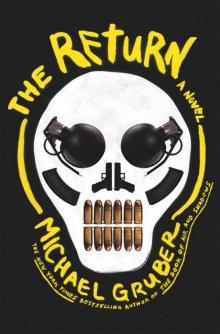 The Return: A Novel
The Return: A Novel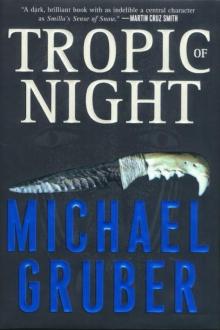 Tropic of Night jp-1
Tropic of Night jp-1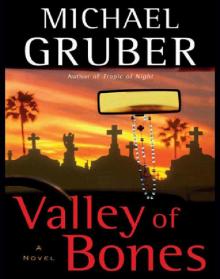 Valley of Bones
Valley of Bones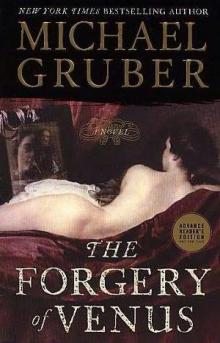 The Forgery of Venus
The Forgery of Venus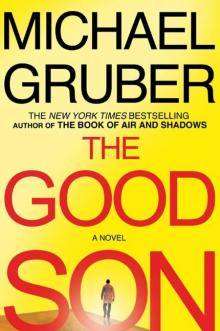 The Good Son
The Good Son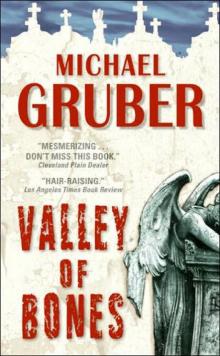 Valley of Bones jp-2
Valley of Bones jp-2 Night of the Jaguar
Night of the Jaguar The Book of Air and Shadows
The Book of Air and Shadows